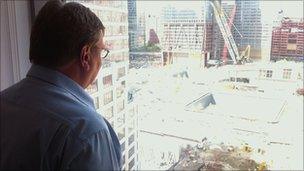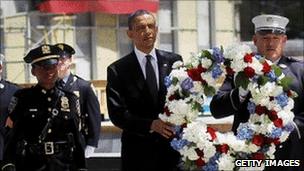Bin Laden death: Can the US find closure over 9/11?
- Published
- comments

Cranes are at work at Ground Zero
New York
It was a sombre ceremony in a slightly eerie place. I have peered into the construction site several times but never been inside before. Surrounded by soaring skyscrapers, Ground Zero is a hole, a wound, a gap. Of course it is only so by our knowledge of the death and destruction that happened on this now silent site. Standing just feet away from President Barack Obama as he laid a wreath with an air of grim triumph, I reflected that it is a place that almost overloads you with the sense of loss.
Soon after the president left, the cranes were at work again, carrying on the work that will eventually turn the site of the attack into a memorial. Possibly the long delays in achieving this aim are for mundane reasons but there is almost a sense that America doesn't want a serene and static memorial, but a churning, changing reminder that even the physical devastation isn't yet in the past.
I am not sure how much that will change with the death of Osama Bin Laden. The president wants closure, and hopes his visit will achieve a measure of it. A couple of people I spoke to told me closure could never be real. A firefighter from Boston who spent more than eight months searching through the rubble said every day he thought of what had happened. Not surprisingly, a man who lost his wife said it was not like getting over a relationship that had ended, the hurt would never go away, closure could never be real.
That must be so for those who mourn. But how true is it for America? The first attack on the American mainland since the nation was formed threw into stark relief some existing traits of the nation and created new ones.

Mr Obama may be trying to write a different story for his war-weary country's future
A sense that the idea of the US was under constant assault and that the country faces more than physical danger. A sense of vulnerability and insecurity that was new and traumatic. A need to celebrate the abstract concept of America. A belief in the curative properties of the might of military and a patriotism so intense that it burns.
The attack on America led directly to one war that is still going on, Afghanistan, and so to a debate about the limits of what the US can and should do. The new fear of attack and worry about terrible weapons in the hands of terrible people led to the Iraq War. Some still defend it, more see it as a wrong turn. President Obama was elected, at least in part, by those who wanted to see America's image in the world change from blundering bully to positive partner. It arguably made America focus on one threat in one part of the world rather than others that matter more.
The killing of Bin Laden perhaps brings a chapter to a close, as Mr Obama tries to write a different history for his country's future. America is weary of war and has revelled in this violent victory, the extra-judicial execution of an accused mass murderer. As I write I am looking out over the two square holes, where the Twin Towers once stood. It makes me shiver. But perhaps after this death, the policy and mind-set of the world's only super power will no longer be driven by this one dreadful atrocity and the fear of its repetition.